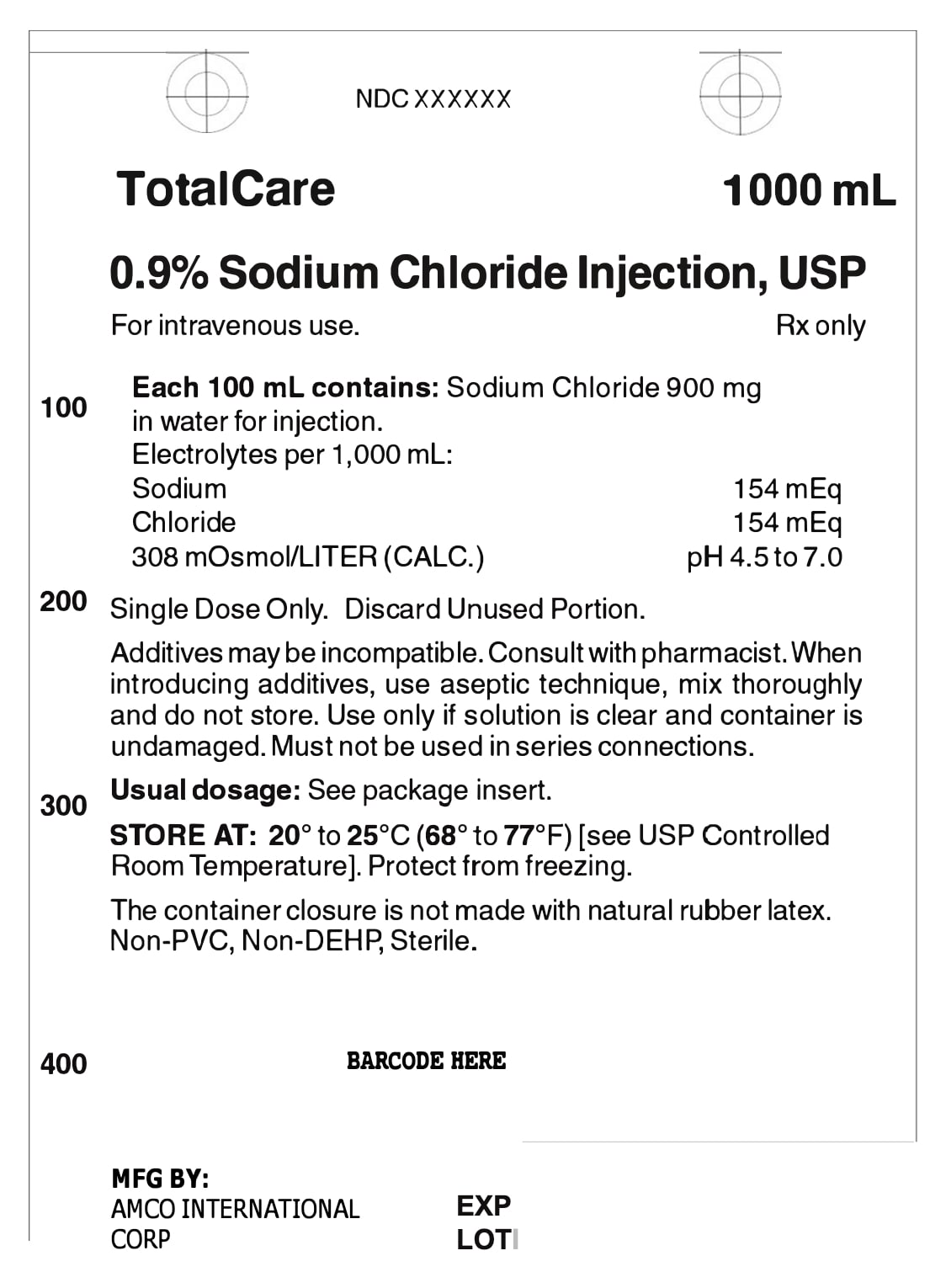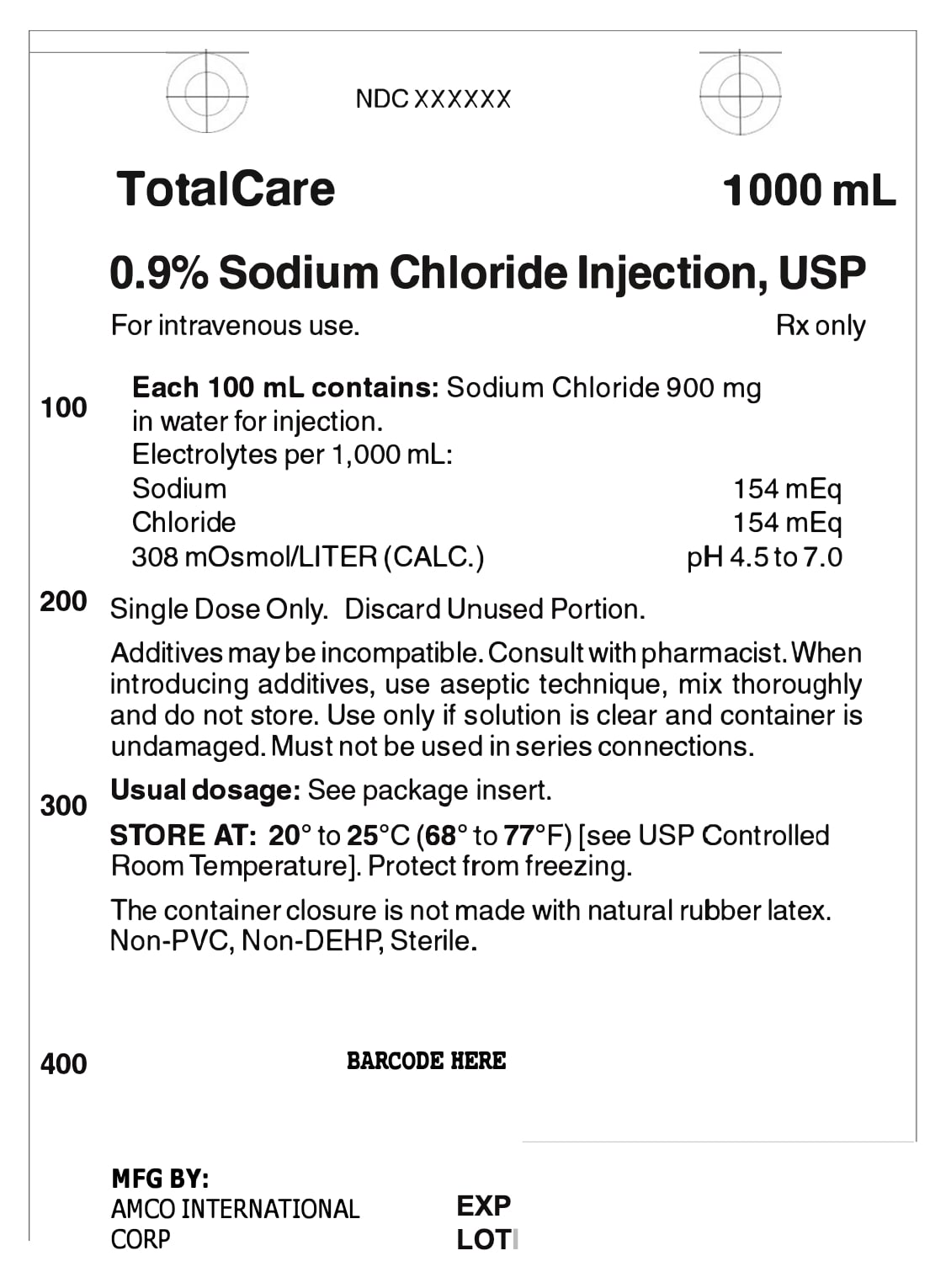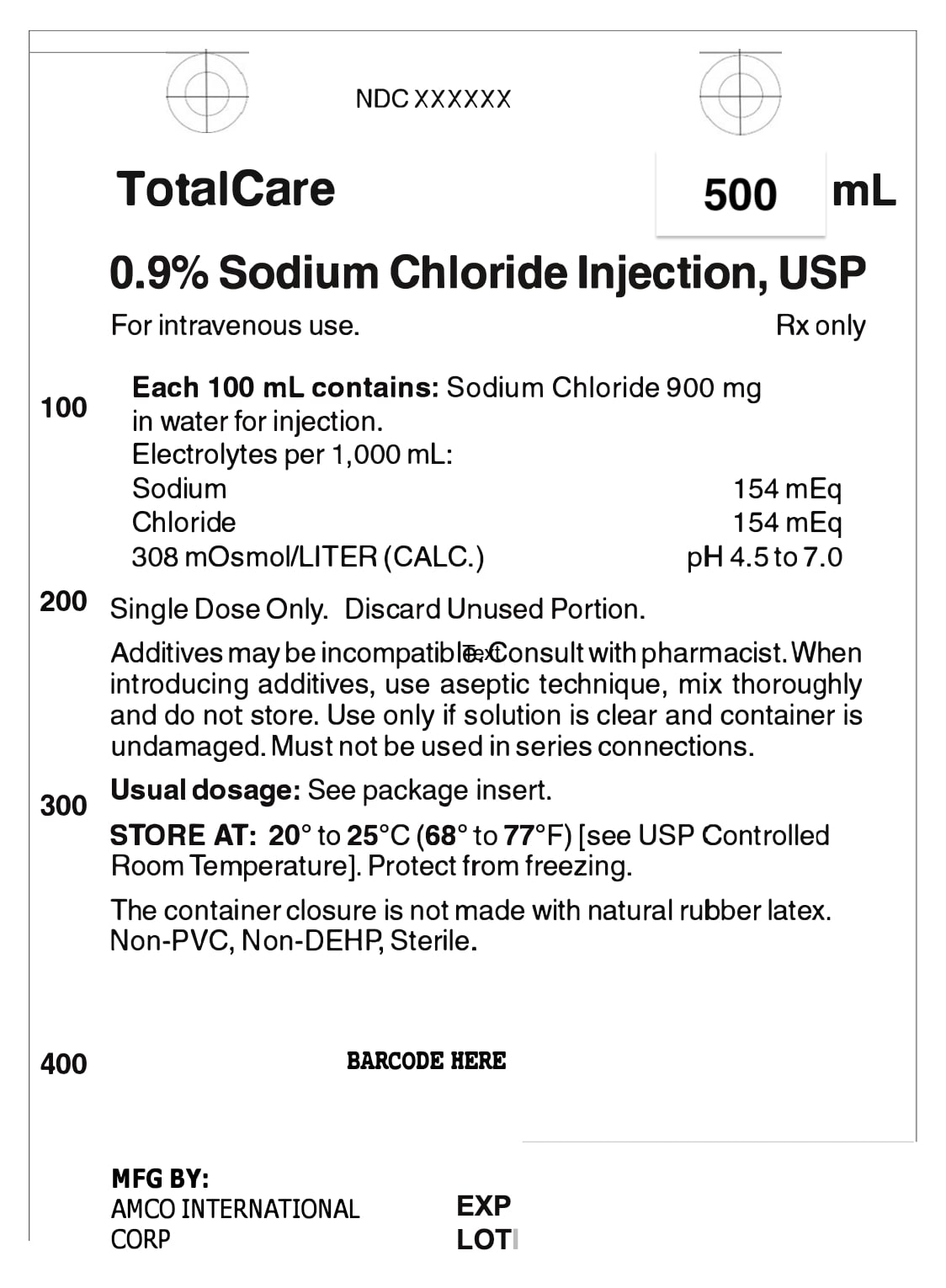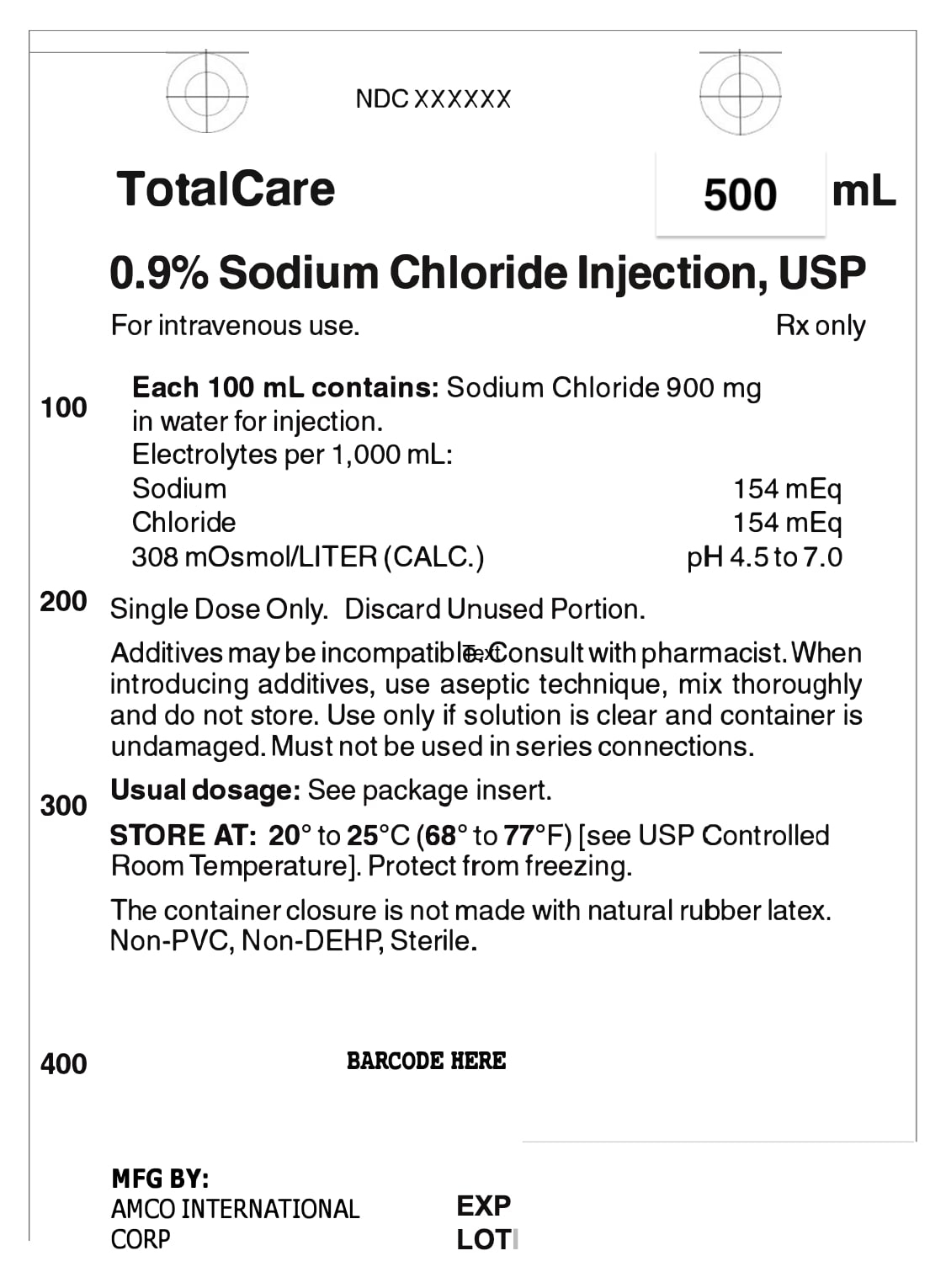0.9% SODIUM CHLORIDE INJECTION, 1000ML, BLUE PHARMA, TOTALCARE- sodium chloride 0.9% w/v for intravenous infusion injection, solution 0.9% SODIUM CHLORIDE INJECTION, 1000ML, DRE BIOLAB, TOTALCARE- sodium chloride 0.9% w/v for intravenous infusion injection, solution 0.9% SODIUM CHLORIDE INJECTION, 500ML, DRE BIOLAB, TOTALCARE- sodium chloride 0.9% w/v for intravenous infusion injection, solution 0.9% SODIUM CHLORIDE INJECTION, 500ML, BLUE PHARMACEUTICALS, TOTALCARE- sodium chloride 0.9% w/v for intravenous infusion injection, solution
0.9% Sodium Chloride Injection, 500mL, Blue Pharmaceuticals, TotalCare by
Drug Labeling and Warnings
0.9% Sodium Chloride Injection, 500mL, Blue Pharmaceuticals, TotalCare by is a Prescription medication manufactured, distributed, or labeled by AMCO INTERNATIONAL CORP. Drug facts, warnings, and ingredients follow.
Drug Details [pdf]
-
DESCRIPTION
0.9% Sodium Chloride Injection, USP solution is sterile and nonpyrogenic. It is a parenteral solution containing sodium chloride in water for injection intended for intravenous administration.
For 0.9% Sodium Chloride Injection, USP, each 100 mL contains 900 mg sodium chloride in water for injection. Electrolytes per 1,000 mL: sodium 154 mEq; chloride 154 mEq. The osmolarity is 308 mOsmol/L (calc.).
The pH in the 100 mL and smaller containers is 6.0; for the 250 mL and larger containers, the pH is 5.6. The pH range is 4.5 to 7.0 for all containers.
The solution contains no bacteriostat, antimicrobial agent or added buffer and is intended only as a single-dose injection. When smaller doses are required the unused portion should be discarded.
The solution is a parenteral fluid and electrolyte replenisher.
Sodium Chloride, USP is chemically designated NaCl, a white crystalline powder freely soluble in water. Water for injection, USP is chemically designated H2O.The flexible container is fabricated from a specially formulated non-plasticized, film containing polypropylene and thermoplastic elastomers. The bag has a needle-free injection port and can accept standard luer lock syringes to add medication. The amount of water that can permeate from the container into the overwrap is insufficient to affect the solution significantly. Solutions in contact with the flexible container can leach out certain of the container's chemical components in very small amounts within the expiration period. The suitability of the container material has been confirmed by tests in animals according to USP biological tests for plastic containers.
-
CLINICAL PHARMACOLOGY
When administered intravenously, the solution provides a source of water and electrolytes.
Solutions which provide combinations of hypotonic or isotonic concentrations of sodium chloride are suitable for parenteral maintenance or replacement of water and electrolyte requirements.
Isotonic concentrations of sodium chloride are suitable for parenteral replacement of chloride losses that exceed or equal the sodium loss. Hypotonic concentrations of sodium chloride are suited for parenteral maintenance of water requirements when only small quantities of salt are desired. A hypertonic concentration of sodium chloride may be used to repair severe salt depletion syndrome.
Sodium chloride in water dissociates to provide sodium (Na+) and chloride (Cl-) ions. Sodium (Na+) is the principal cation of the extracellular fluid and plays a large part in the therapy of fluid and electrolyte disturbances. Chloride (Cl-) has an integral role in buffering action when oxygen and carbon dioxide exchange occurs in the red blood cells. The distribution and excretion of sodium (Na+) and chloride (Cl-) are largely under the control of the kidney which maintains a balance between intake and output.
Water is an essential constituent of all body tissues and accounts for approximately 70% of total body weight. Average normal adult daily requirements range from two to three liters (1.0 to 1.5 liters each for insensible water loss by perspiration and urine production).
Water balance is maintained by various regulatory mechanisms. Water distribution depends primarily on the concentration of electrolytes in the body compartments and sodium (Na+) plays a major role in maintaining physiologic equilibrium.
- INDICATIONS & USAGE
- CONTRAINDICATIONS
-
WARNINGS AND PRECAUTIONS
Sodium Chloride Injection, USP should be used with great care, if at all, in patients with congestive heart failure, severe renal insufficiency and in clinical states in which there exists edema with sodium retention.
The intravenous administration of Sodium Chloride Injection, USP can cause fluid and/or solute overloading resulting in dilution of serum electrolyte concentrations, overhydration, congested states or pulmonary edema.
The risk of dilutive states is inversely proportional to the electrolyte concentration of the injections. The risk of solute overload causing congested states with peripheral and pulmonary edema is directly proportional to the electrolyte concentrations of the injections.
In patients with diminished renal function, administration of Sodium Chloride Injection, USP may result in sodium retention.
General
Do not use plastic containers in series connections. Such use could result in air embolism due to residual air being drawn from the primary container before administration of the fluid from the secondary container is completed.
Pressurizing intravenous solutions contained in flexible plastic containers to increase flow rates can result in air embolism if the residual air in the container is not fully evacuated prior to administration.
Use of a vented intravenous administration set with the vent in the open position could result in air embolism. Vented intravenous administration sets with the vent in the open position should not be used with flexible plastic containers.
Laboratory Tests
Clinical evaluation and periodic laboratory determinations are necessary to monitor changes in fluid balance, electrolyte concentrations and acid-base balance during prolonged parenteral therapy or whenever the condition of the patient warrants such evaluation.
- DRUG INTERACTIONS
-
PREGNANCY
Teratogenic Effects
Pregnancy Category C
Animal reproduction studies have not been conducted with Sodium Chloride Injection, USP. It is also not known whether Sodium Chloride Injection, USP can cause fetal harm when administered to a pregnant woman or can affect reproduction capacity. Sodium Chloride Injection, USP should be given to a pregnant woman only if clearly needed.
- NURSING MOTHERS
- LABOR & DELIVERY
- PEDIATRIC USE
-
GERIATRIC USE
Clinical studies of Sodium Chloride Injection, USP did not include sufficient numbers of subjects aged 65 and over to determine whether they respond differently from younger subjects. Other reported clinical experience has not identified differences in responses between elderly and younger patients. In general, dose selection for an elderly patient should be cautious, usually starting at the low end of the dosing range, reflecting the greater frequency of decreased hepatic, renal, or cardiac function, and of concomitant disease or drug therapy.
This drug is known to be substantially excreted by the kidney, and the risk of toxic reactions to this drug may be greater in patients with impaired renal function. Because elderly patients are more likely to have decreased renal function, care should be taken in dose selection, and it may be useful to monitor renal function.
Do not administer unless solution is clear and container is undamaged. Discard unused portion.
-
ADVERSE REACTIONS
Reactions which may occur because of the solution or the technique of administration include febrile response, infection at the site of injection, venous thrombosis or phlebitis extending from the site of injection, extravasation and hypervolemia.
If an adverse reaction does occur, discontinue the infusion, evaluate the patient, institute appropriate therapeutic countermeasures and save the remainder of the fluid for examination if deemed necessary.
- OVERDOSAGE
-
DOSAGE & ADMINISTRATION
The dose is dependent upon the age, weight and clinical condition of the patient.
Additives may be incompatible. Consult with pharmacist, if available. When introducing additives, use aseptic technique, mix thoroughly and do not store.Parenteral drug products should be inspected visually for particulate matter and discoloration prior to administration, whenever solution and container permit (see PRECAUTIONS).
-
INSTRUCTIONS FOR USE
Check flexible container solution composition, lot number, and expiry date.
Do not remove solution container from its overwrap until immediately before use. Use sterile equipment and aseptic technique.To Open
1. Turn solution container over so that the text is face down. Using the pre-cut corner tabs, peel open the overwrap and remove solution container. 2. Check the solution container for leaks by squeezing firmly. If leaks are found, or if the seal is not intact, discard the solution.
3. Do not use if the solution is cloudy or a precipitate is present.To Add Medication
The Additive port of the container accepts standard luer lock syringes. Do not use a needle for additions.
1. Identify LIGHT BLUE Additive Port with arrow pointing toward solution container.
2. Immediately before injecting additives, break off LIGHT BLUE Additive Port Cap with the arrow pointing toward solution container. 3. Hold base of LIGHT BLUE Additive Port.
4. Attach Luer Lock syringe to the threaded LIGHT BLUE Additive Port. Inject additive.
5. Mix solution container contents thoroughly.Preparation for Administration
1. Immediately before inserting the infusion set, break off BLUE Infusion Port Cap with the arrow pointing away from container. 2. Use a non-vented infusion set or close the air-inlet on a vented set.
3. Close the roller clamp of the infusion set.
4. Hold the base of BLUE Infusion Port.5. Insert spike through BLUE Infusion Port by rotating wrist slightly until the spike is inserted. NOTE: See full directions accompanying administration set.
WARNING: Do not use flexible container in series connections.
-
HEALTH CARE PROVIDER LETTER
Important Prescribing Information
Subject: Marketing of Pending Approval 0.9% Sodium Chloride Injection to address drug shortages
Dear Healthcare Professional,
To prevent a drug shortage of large volume parenteral fluid drug products, we are
coordinating with the U.S. Food and Drug Administration (FDA) to temporarily import 0.9% Sodium Chloride Injection
(250 mL; 500 mL and 1,000 mL) from specific DRE manufacturing facilities. FDA has not approved these
products manufactured by this facility.
You may be provided with additional letters for other imported products you receive. Please read each letter in its
entirety because each letter may contain different product specific information.
Effective immediately, and during this temporary period, we will offer the following imported products:It is important to note the following:
After opening the carton or box, the bags should be inspected visually to confirm there is no visible particulate
matter or bag defects, such as leaks. Container integrity is imperative to ensure sterility of products listed in the
table above. Parenteral drug products should be inspected visually for particulate matter and bag defects prior to
administration, whenever solution or container permits.
USE A NEW BAG IF PARTICULATES ARE VISIBLE OR IF THE IV BAG CONTAINS A LEAK.
Reporting Adverse Events or Product Quality Issues
To report adverse events associated with these imported products, please call. Adverse events or quality problems experienced with the use of these imported products may also be
reported to the FDA's MedWatch Adverse Event Reporting program either online, by regular mail or by fax:
Complete and submit the report Online: www.fda.gov/medwatch/report.htm
Regular mail or Fax: Download form www.fda.gov/MedWatch/getforms.htm or call 1-800-332-1088 to
request a reporting form, then complete and return to the address on the pre-addressed form, or submit by
fax to 1-800-FDA-0178 (1-800-332-0178).
To report product quality issues associated with these imported products, please contact
If you have any questions about the information contained in this letter or the use of the imported products, please
contact
To place an order, please contact -
PACKAGE LABEL - PRINCIPAL DISPLAY – 0.9% Sodium Chloride 1000 mL Bag Label
Each 100 ml contains: Sodium Chloride 900 mg in water for injection.
[NDC: 84866-6667-1]
DRE HEALTH TotalCare
For intravenous use. Rx only1 000ml 0.9% Sodium Chloride Injection, USP
Electrolytes per 1,000 ml:
Sodium
Chloride
308 mOsmol/LITER (CALC.)SingleDoseOnly. DiscardUnusedPortion.
154 mEq
154 mEq pH 4.5to 7.0
Additives may be incompatible. Consult with pharmacist. When introducing additives, use aseptic technique, mux thoroughly and do not store. Use only if solution is clear and container is undamaged. Must not be used in series connections.
Usual dosage: See package insert. °°°°
STORE AT: 20 to 25 C (68 to 77 F) [see USP Controlled RoomTemperature].Protectfromfreezing.
The container closure is not made with natural rubber latex. Non-PVC, Non-DEHP, Sterile.
MFG BY: AMCO INTERNATIONAL CORP
EXP. LOT.
[BARCODE HERE]
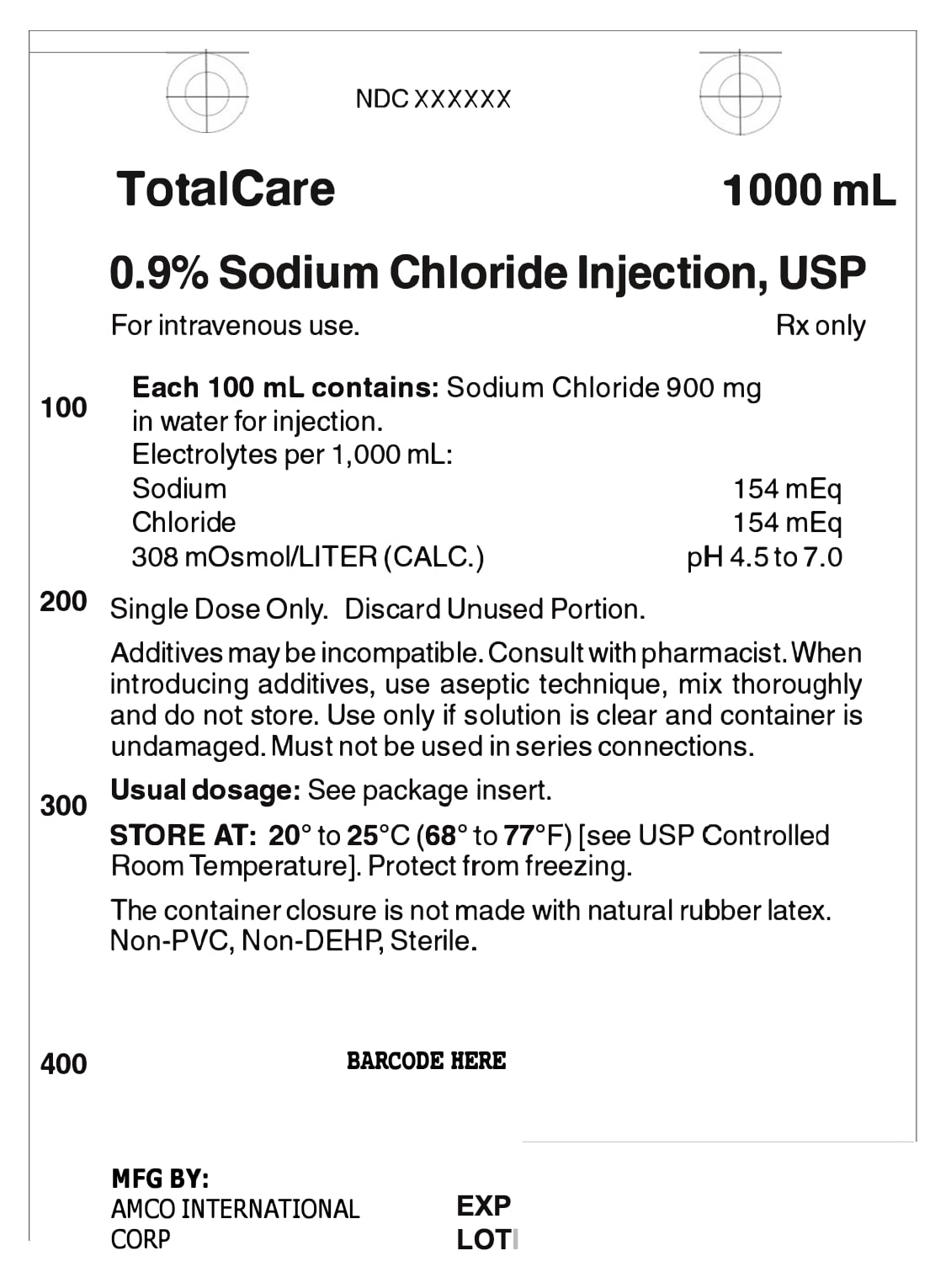
-
PACKAGE LABEL - PRINCIPAL DISPLAY – 0.9% Sodium Chloride 500 mL Bag Label
Each 100 ml contains: Sodium Chloride 900 mg in water for injection.
[NDC: 84866-6681-1]
DRE BioLab TotalCare
For intravenous use. Rx only500ml 0.9% Sodium Chloride Injection, USP
Electrolytes per 1,000 ml:
Sodium
Chloride
308 mOsmol/LITER (CALC.)SingleDoseOnly. DiscardUnusedPortion.
154 mEq
154 mEq pH 4.5to 7.0
Additives may be incompatible. Consult with pharmacist. When introducing additives, use aseptic technique, mux thoroughly and do not store. Use only if solution is clear and container is undamaged. Must not be used in series connections.
Usual dosage: See package insert. °°°°
STORE AT: 20 to 25 C (68 to 77 F) [see USP Controlled RoomTemperature].Protectfromfreezing.
The container closure is not made with natural rubber latex. Non-PVC, Non-DEHP, Sterile.
MFG BY: AMCO INTERNATIONAL CORP
EXP. LOT.
[BARCODE HERE]
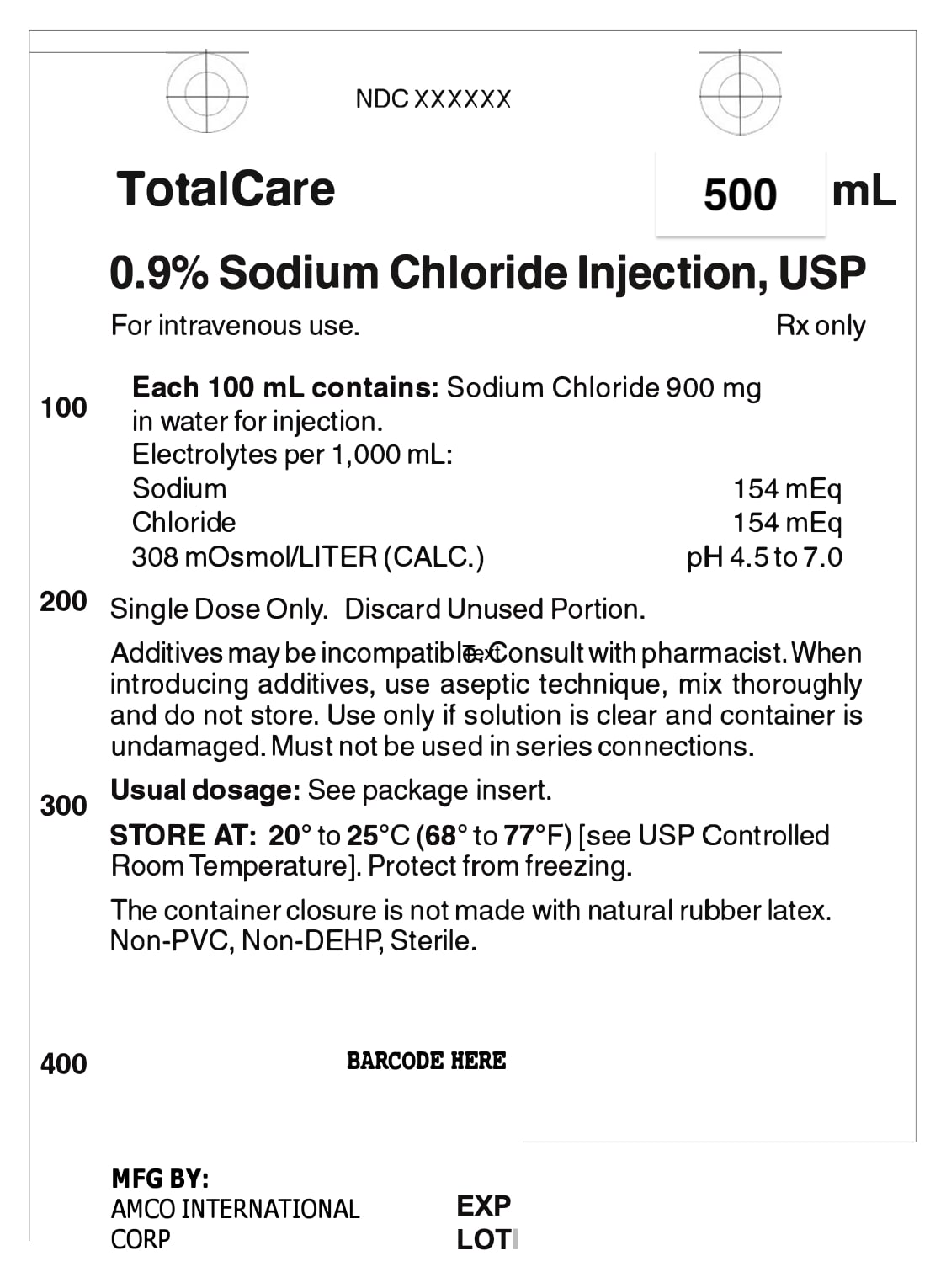
-
PACKAGE LABEL - PRINCIPAL DISPLAY – 0.9% Sodium Chloride 500 mL Case Label
Each 100 ml contains: Sodium Chloride 900 mg in water for injection.
[NDC: 84866-6681-2]
DRE BioLab TotalCare
For intravenous use. Rx only500ml 0.9% Sodium Chloride Injection, USP
Electrolytes per 1,000 ml:
Sodium
Chloride
308 mOsmol/LITER (CALC.)SingleDoseOnly. DiscardUnusedPortion.
154 mEq
154 mEq pH 4.5to 7.0
Additives may be incompatible. Consult with pharmacist. When introducing additives, use aseptic technique, mux thoroughly and do not store. Use only if solution is clear and container is undamaged. Must not be used in series connections.
Usual dosage: See package insert. °°°°
STORE AT: 20 to 25 C (68 to 77 F) [see USP Controlled RoomTemperature].Protectfromfreezing.
The container closure is not made with natural rubber latex. Non-PVC, Non-DEHP, Sterile.
MFG BY: AMCO INTERNATIONAL CORP
EXP. LOT.
[BARCODE HERE]
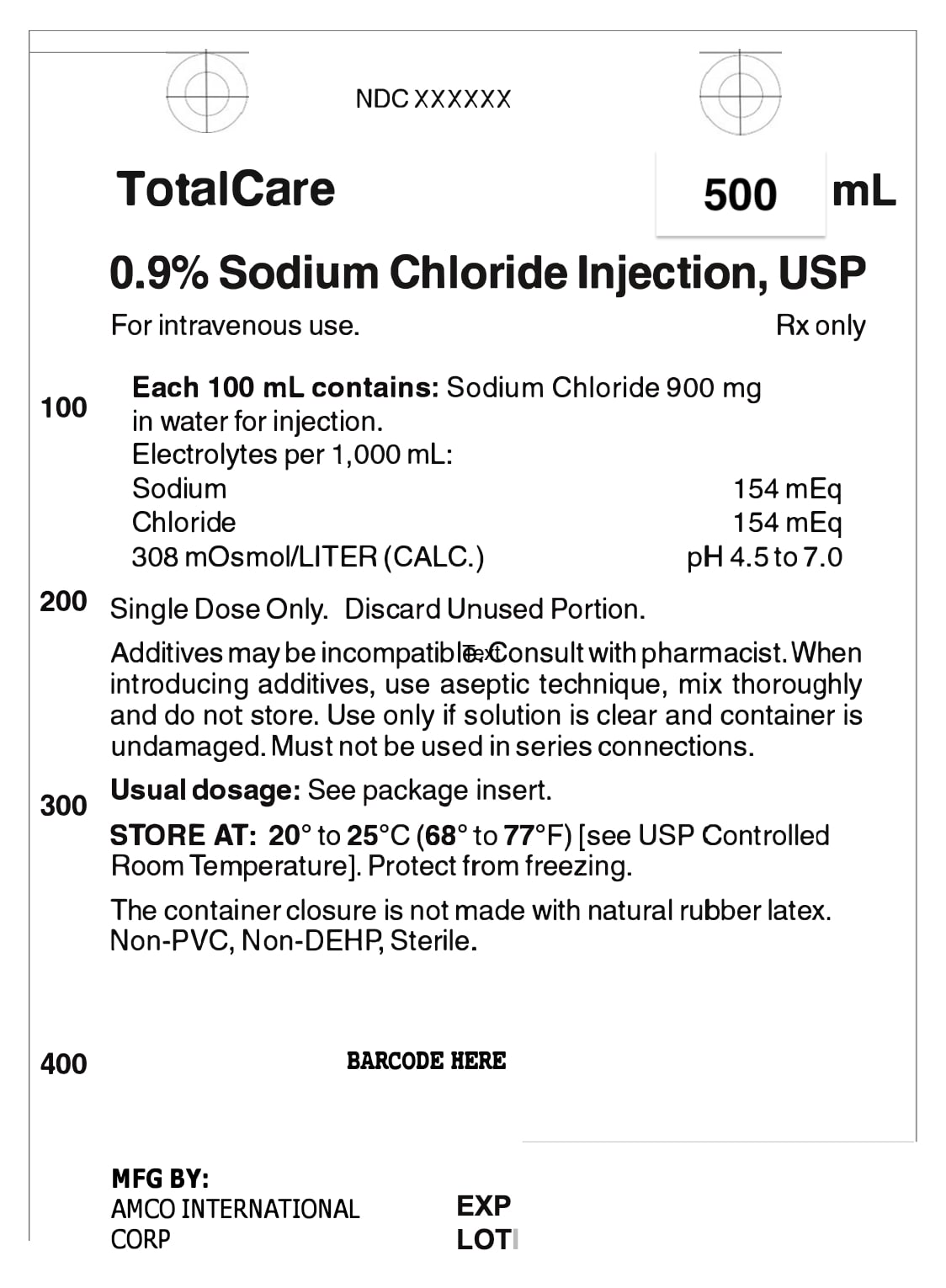
-
PACKAGE LABEL - PRINCIPAL DISPLAY – 0.9% Sodium Chloride 1000 mL Case Label
Each 100 ml contains: Sodium Chloride 900 mg in water for injection.
[NDC: 84866-6666-2]
DRE BioLab TotalCare
For intravenous use. Rx only500ml 0.9% Sodium Chloride Injection, USP
Electrolytes per 1,000 ml:
Sodium
Chloride
308 mOsmol/LITER (CALC.)SingleDoseOnly. DiscardUnusedPortion.
154 mEq
154 mEq pH 4.5to 7.0
Additives may be incompatible. Consult with pharmacist. When introducing additives, use aseptic technique, mux thoroughly and do not store. Use only if solution is clear and container is undamaged. Must not be used in series connections.
Usual dosage: See package insert. °°°°
STORE AT: 20 to 25 C (68 to 77 F) [see USP Controlled RoomTemperature].Protectfromfreezing.
The container closure is not made with natural rubber latex. Non-PVC, Non-DEHP, Sterile.
MFG BY: AMCO INTERNATIONAL CORP
EXP. LOT.
[BARCODE HERE]
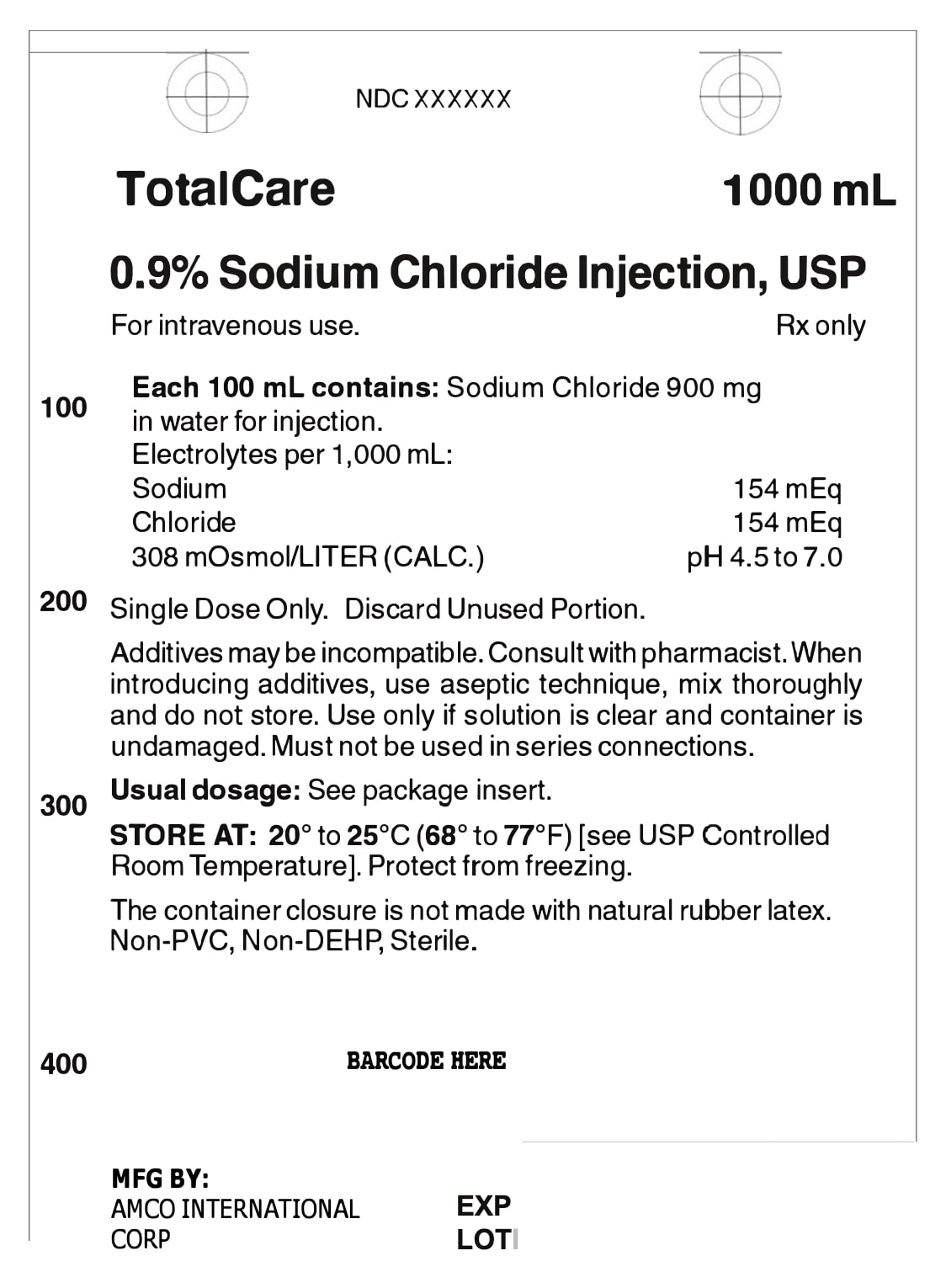
-
PACKAGE LABEL - PRINCIPAL DISPLAY – 0.9% Sodium Chloride 1000 mL Case Label
Each 100 ml contains: Sodium Chloride 900 mg in water for injection.
[NDC: 84866-6667-2]
DRE BioLab TotalCare
For intravenous use. Rx only500ml 0.9% Sodium Chloride Injection, USP
Electrolytes per 1,000 ml:
Sodium
Chloride
308 mOsmol/LITER (CALC.)SingleDoseOnly. DiscardUnusedPortion.
154 mEq
154 mEq pH 4.5to 7.0
Additives may be incompatible. Consult with pharmacist. When introducing additives, use aseptic technique, mux thoroughly and do not store. Use only if solution is clear and container is undamaged. Must not be used in series connections.
Usual dosage: See package insert. °°°°
STORE AT: 20 to 25 C (68 to 77 F) [see USP Controlled RoomTemperature].Protectfromfreezing.
The container closure is not made with natural rubber latex. Non-PVC, Non-DEHP, Sterile.
MFG BY: AMCO INTERNATIONAL CORP
EXP. LOT.
[BARCODE HERE]
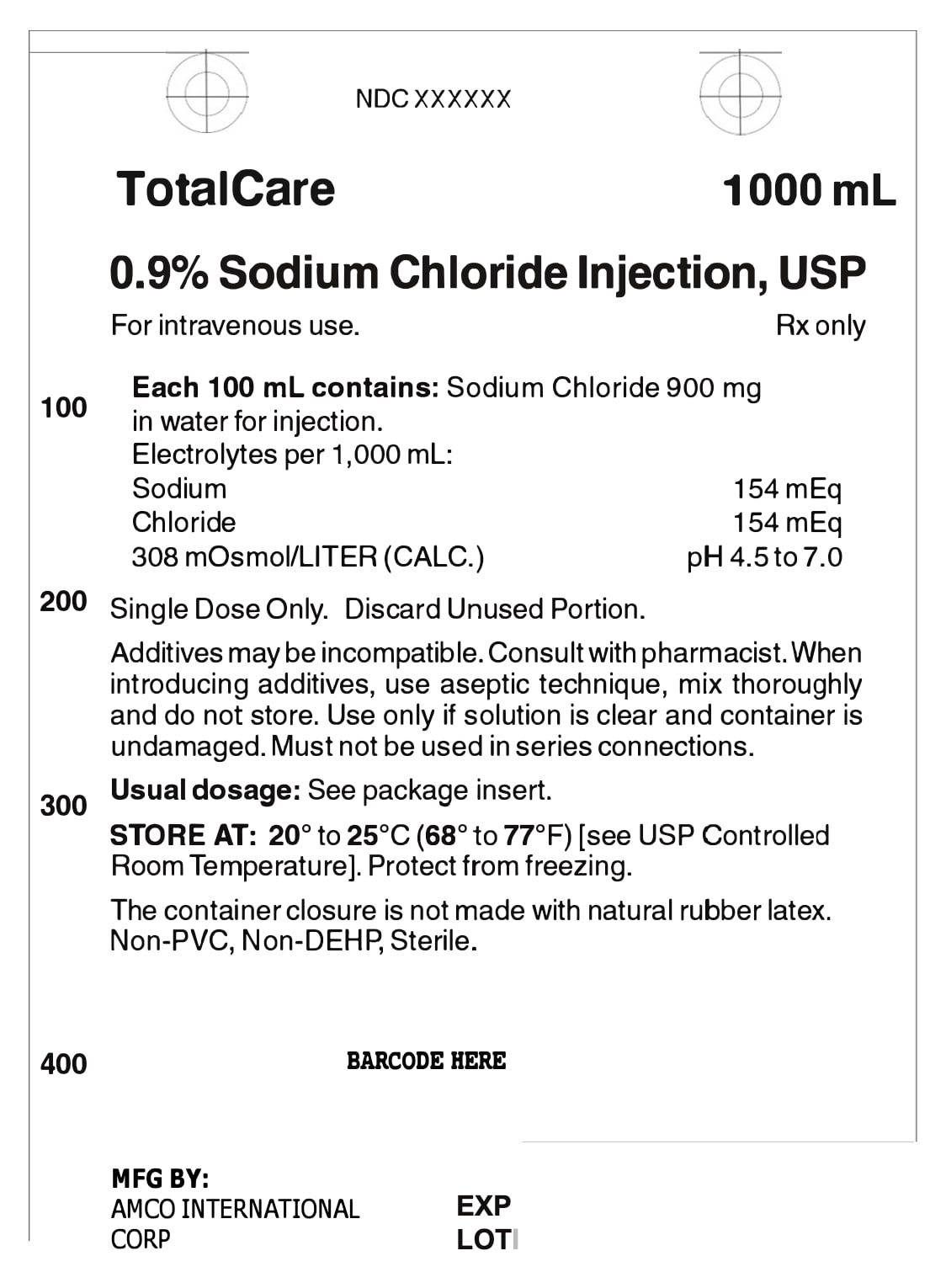
-
PACKAGE LABEL - PRINCIPAL DISPLAY – 0.9% Sodium Chloride 1000 mL Bag Label
Each 100 ml contains: Sodium Chloride 900 mg in water for injection.
[NDC: 84866-6666-1]
DRE HEALTH TotalCare
For intravenous use. Rx only1 000ml 0.9% Sodium Chloride Injection, USP
Electrolytes per 1,000 ml:
Sodium
Chloride
308 mOsmol/LITER (CALC.)SingleDoseOnly. DiscardUnusedPortion.
154 mEq
154 mEq pH 4.5to 7.0
Additives may be incompatible. Consult with pharmacist. When introducing additives, use aseptic technique, mux thoroughly and do not store. Use only if solution is clear and container is undamaged. Must not be used in series connections.
Usual dosage: See package insert. °°°°
STORE AT: 20 to 25 C (68 to 77 F) [see USP Controlled RoomTemperature].Protectfromfreezing.
The container closure is not made with natural rubber latex. Non-PVC, Non-DEHP, Sterile.
MFG BY: AMCO INTERNATIONAL CORP
EXP. LOT.
[BARCODE HERE]
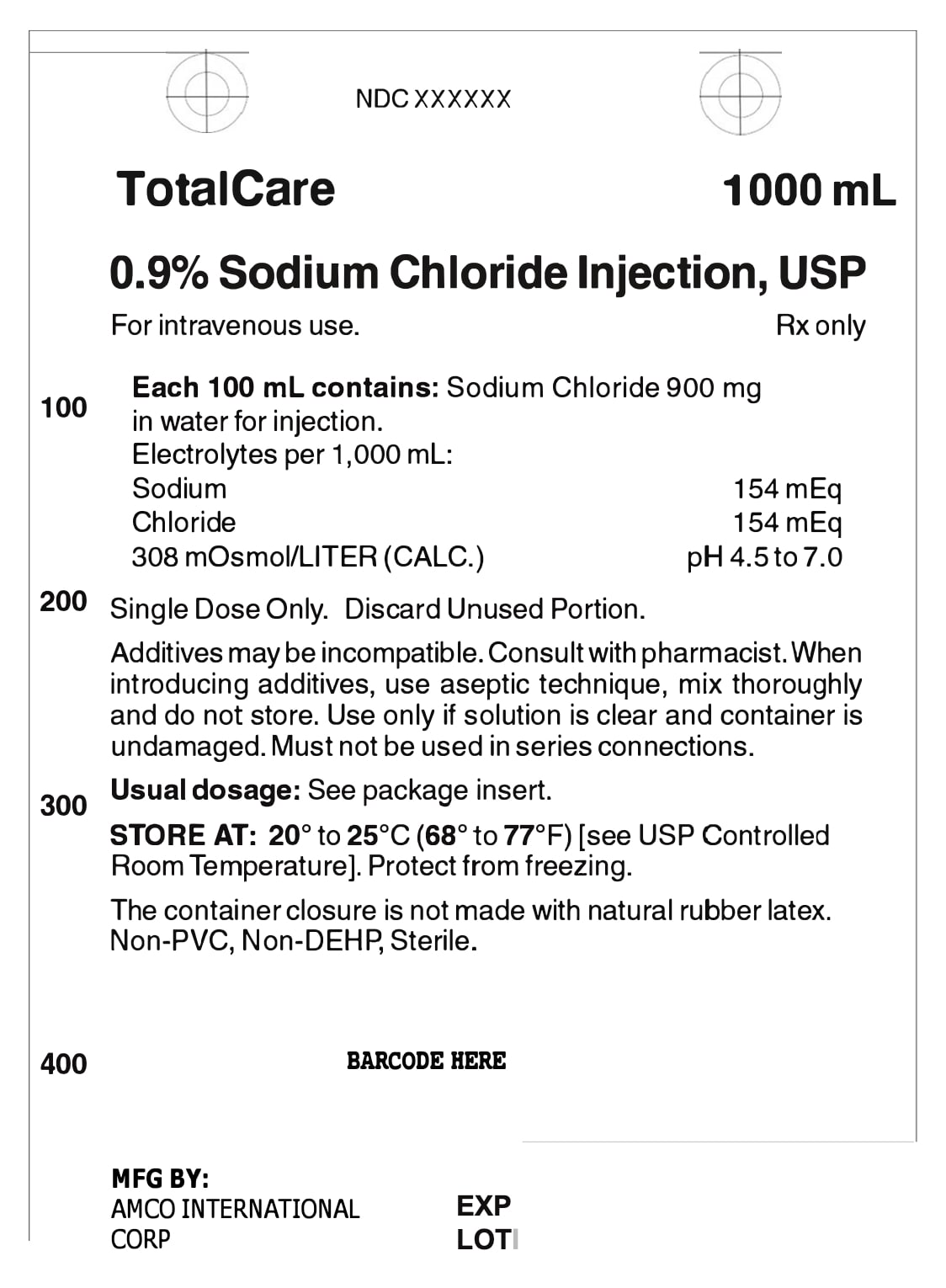
- Blue Pharma 1000mL Bag Label
- Blue Pharma 1000mL case label
- BLUE PHARMA 500mL bag label
- BLUE PHARMA 500ml CASE LABEL
-
INGREDIENTS AND APPEARANCE
0.9% SODIUM CHLORIDE INJECTION, 1000ML, BLUE PHARMA, TOTALCARE
sodium chloride 0.9% w/v for intravenous infusion injection, solutionProduct Information Product Type HUMAN PRESCRIPTION DRUG Item Code (Source) NDC: 84866-6669 Route of Administration INTRAVENOUS Active Ingredient/Active Moiety Ingredient Name Basis of Strength Strength SODIUM CHLORIDE (UNII: 451W47IQ8X) (CHLORIDE ION - UNII:Q32ZN48698, SODIUM CATION - UNII:LYR4M0NH37) SODIUM CHLORIDE 9 mg in 1 mL Inactive Ingredients Ingredient Name Strength WATER (UNII: 059QF0KO0R) Packaging # Item Code Package Description Marketing Start Date Marketing End Date 1 NDC: 84866-6669-2 20 in 1 CASE 10/31/2024 1 NDC: 84866-6669-1 1000 mL in 1 BAG; Type 0: Not a Combination Product Marketing Information Marketing Category Application Number or Monograph Citation Marketing Start Date Marketing End Date unapproved drug other 10/30/2024 0.9% SODIUM CHLORIDE INJECTION, 1000ML, DRE BIOLAB, TOTALCARE
sodium chloride 0.9% w/v for intravenous infusion injection, solutionProduct Information Product Type HUMAN PRESCRIPTION DRUG Item Code (Source) NDC: 84866-6666 Route of Administration INTRAVENOUS Active Ingredient/Active Moiety Ingredient Name Basis of Strength Strength SODIUM CHLORIDE (UNII: 451W47IQ8X) (CHLORIDE ION - UNII:Q32ZN48698, SODIUM CATION - UNII:LYR4M0NH37) SODIUM CHLORIDE 9 mg in 1 mL Inactive Ingredients Ingredient Name Strength WATER (UNII: 059QF0KO0R) Packaging # Item Code Package Description Marketing Start Date Marketing End Date 1 NDC: 84866-6666-2 20 in 1 CASE 10/31/2024 1 NDC: 84866-6666-1 1000 mL in 1 BAG; Type 0: Not a Combination Product Marketing Information Marketing Category Application Number or Monograph Citation Marketing Start Date Marketing End Date unapproved drug other 10/30/2024 0.9% SODIUM CHLORIDE INJECTION, 500ML, DRE BIOLAB, TOTALCARE
sodium chloride 0.9% w/v for intravenous infusion injection, solutionProduct Information Product Type HUMAN PRESCRIPTION DRUG Item Code (Source) NDC: 84866-6681(NDC:65219-224) Route of Administration INTRAVENOUS Active Ingredient/Active Moiety Ingredient Name Basis of Strength Strength SODIUM CHLORIDE (UNII: 451W47IQ8X) (CHLORIDE ION - UNII:Q32ZN48698, SODIUM CATION - UNII:LYR4M0NH37) SODIUM CHLORIDE 9 mg in 1 mL Inactive Ingredients Ingredient Name Strength WATER (UNII: 059QF0KO0R) Packaging # Item Code Package Description Marketing Start Date Marketing End Date 1 NDC: 84866-6681-2 20 in 1 CASE 10/31/2024 1 NDC: 84866-6681-1 500 mL in 1 BAG; Type 0: Not a Combination Product Marketing Information Marketing Category Application Number or Monograph Citation Marketing Start Date Marketing End Date ANDA ANDA207310 10/30/2024 0.9% SODIUM CHLORIDE INJECTION, 1000ML, DRE BIOLAB, TOTALCARE
sodium chloride 0.9% w/v for intravenous infusion injection, solutionProduct Information Product Type HUMAN PRESCRIPTION DRUG Item Code (Source) NDC: 84866-6667 Route of Administration INTRAVENOUS Active Ingredient/Active Moiety Ingredient Name Basis of Strength Strength SODIUM CHLORIDE (UNII: 451W47IQ8X) (CHLORIDE ION - UNII:Q32ZN48698, SODIUM CATION - UNII:LYR4M0NH37) SODIUM CHLORIDE 9 mg in 1 mL Packaging # Item Code Package Description Marketing Start Date Marketing End Date 1 NDC: 84866-6667-2 20 in 1 CASE 10/31/2024 1 NDC: 84866-6667-1 1000 mL in 1 BAG; Type 0: Not a Combination Product Marketing Information Marketing Category Application Number or Monograph Citation Marketing Start Date Marketing End Date unapproved drug other 10/30/2024 0.9% SODIUM CHLORIDE INJECTION, 500ML, BLUE PHARMACEUTICALS, TOTALCARE
sodium chloride 0.9% w/v for intravenous infusion injection, solutionProduct Information Product Type HUMAN PRESCRIPTION DRUG Item Code (Source) NDC: 84866-6668 Route of Administration INTRAVENOUS Active Ingredient/Active Moiety Ingredient Name Basis of Strength Strength SODIUM CHLORIDE (UNII: 451W47IQ8X) (CHLORIDE ION - UNII:Q32ZN48698, SODIUM CATION - UNII:LYR4M0NH37) SODIUM CHLORIDE 9 mg in 1 mL Inactive Ingredients Ingredient Name Strength WATER (UNII: 059QF0KO0R) Packaging # Item Code Package Description Marketing Start Date Marketing End Date 1 NDC: 84866-6668-2 20 in 1 CASE 10/31/2024 1 NDC: 84866-6668-1 500 mL in 1 BAG; Type 0: Not a Combination Product Marketing Information Marketing Category Application Number or Monograph Citation Marketing Start Date Marketing End Date unapproved drug other 10/30/2024 Labeler - AMCO INTERNATIONAL CORP (116924852) Establishment Name Address ID/FEI Business Operations AMCO INTERNATIONAL CORP 116924852 manufacture(84866-6666, 84866-6667, 84866-6668, 84866-6669) , relabel(84866-6681) , repack(84866-6681)
© 2026 FDA.report
This site is not affiliated with or endorsed by the FDA.
